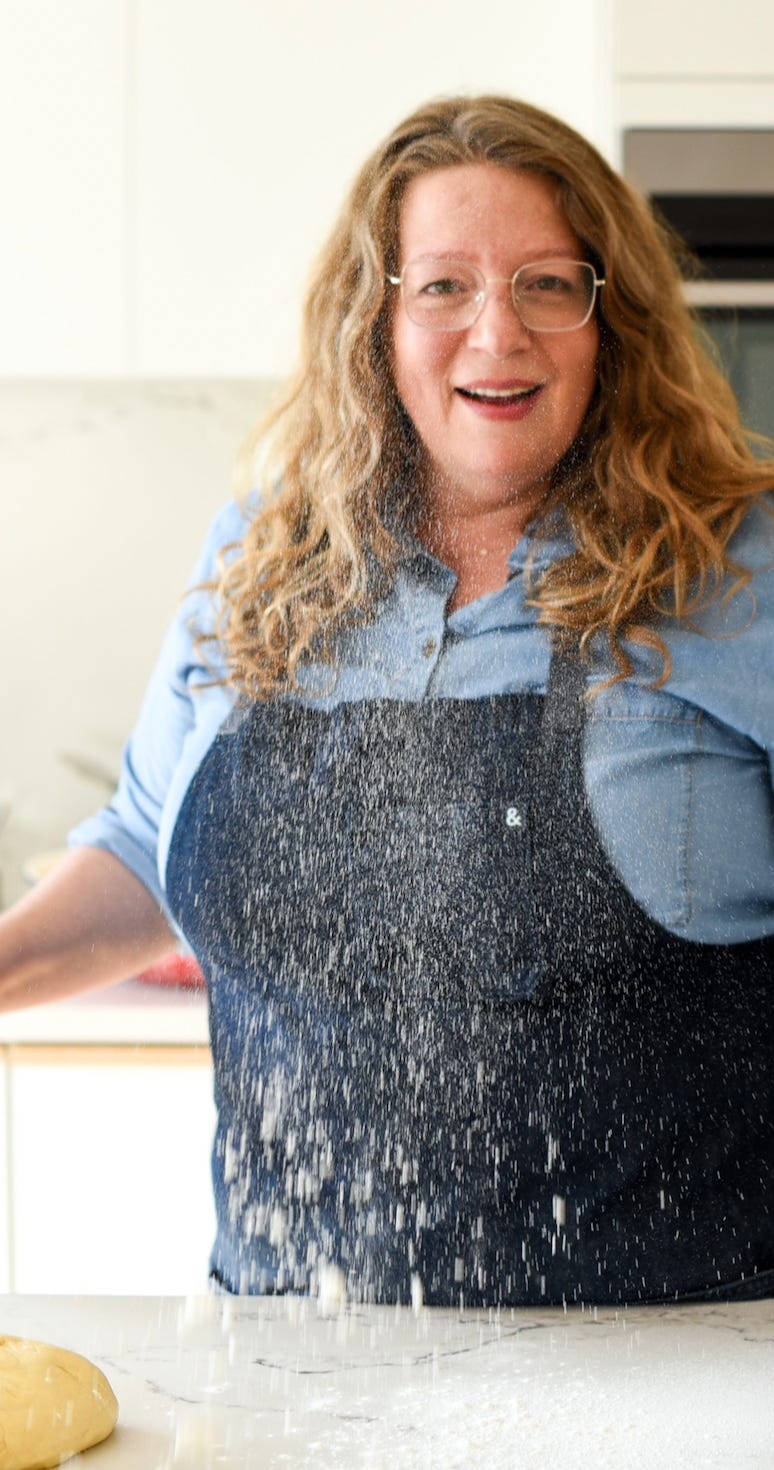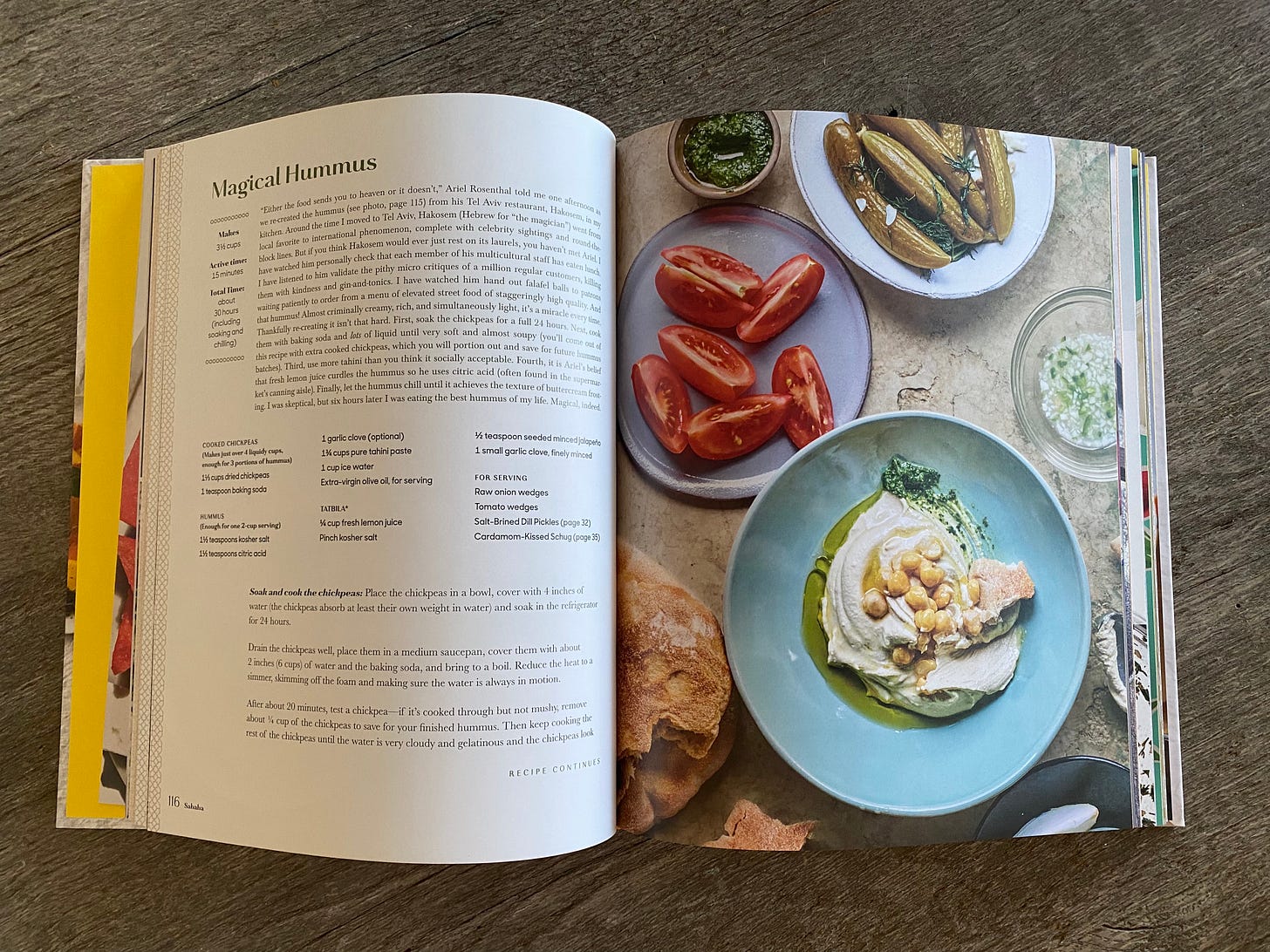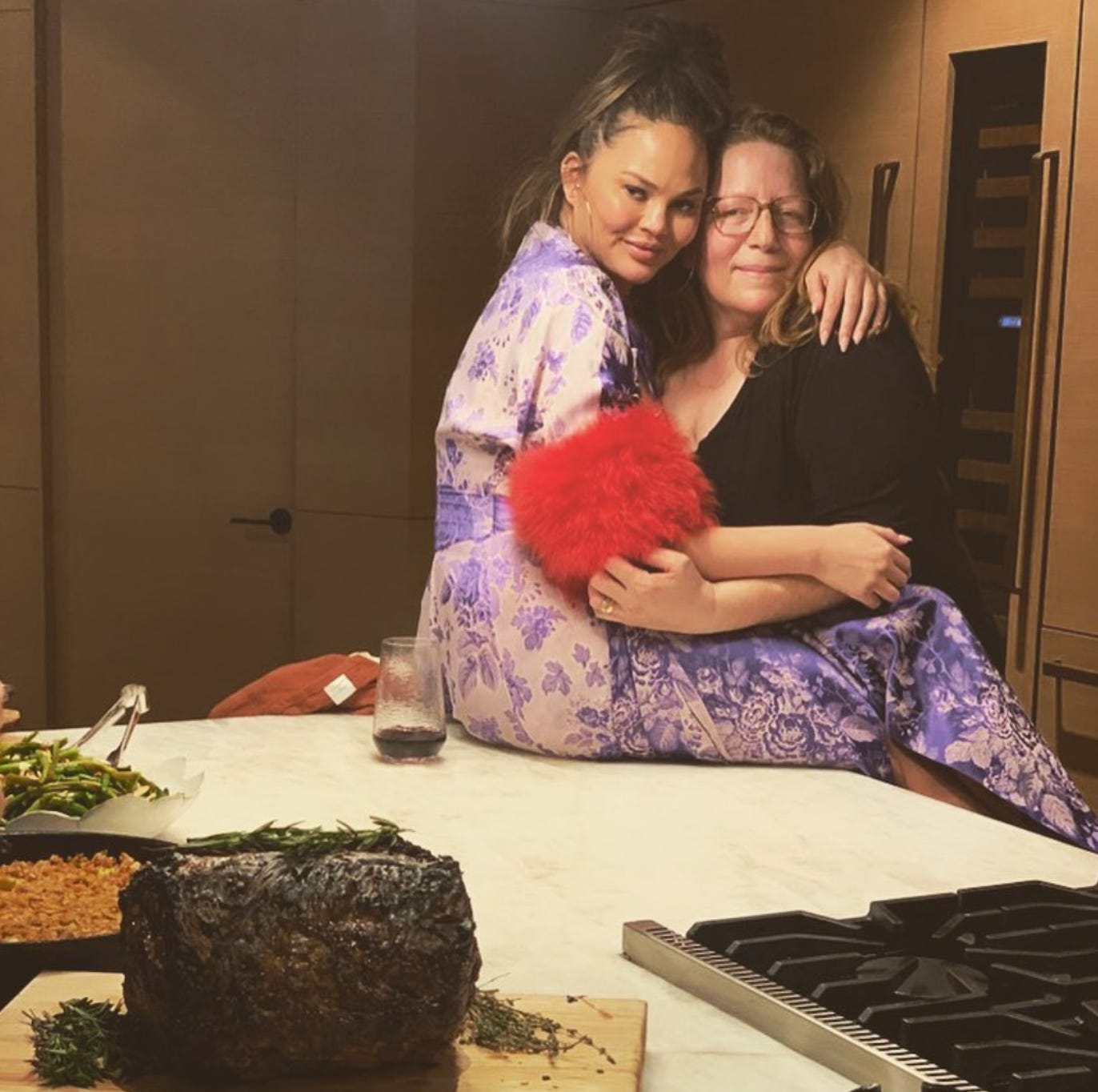Q&A: How to write a cookbook
May 25, 2023 | Vol. 84
From time to time, I’ll be devoting All’s Well to conversations with creative women who inspire me. This week, food writer, recipe developer, and cookbook author Adeena Sussman. Subscribe to get upcoming interviews and roundups.
Adeena Sussman wears many hats, but above all, I believe, she’s a champion of flavor, culture, and discovery through food. Adeena has co-authored a number of wonderful books, including three by Chrissy Teigen, and in 2019, came out with her own. Sababa is inspired by Adeena’s surroundings in Tel Aviv, where she moved after meeting her now-husband. If you haven’t yet flipped through Sababa, you are missing out in a big way. (Two words: shawarma pargiyot) Her new book, Shabbat, comes out in September.
I spoke with Adeena about her journey in cooking, what it takes to write a cookbook, and the must-haves in her own kitchen. Below are excerpts from our conversation:
Was cooking always a part of your life growing up?
I grew up in an Orthodox home in Palo Alto, California, a place with very little kosher infrastructure. We basically made everything, and we weren’t going out much, so the family value was cooking all the time.
My mom didn’t come from a very connected Jewish background, so she learned how to cook and how to cook Jewish at the same time. She always had us involved in the kitchen. From an early age, we were helping make the challahs and desserts, especially, but we were also helping clean the last little pieces of feathers off the chickens that we received once a month from Chicago, frozen, for Shabbat.
Entertaining was also a very big element of our family life. We were known as a place where anyone who needed Shabbat hospitality could pop in for a meal or even stay over. Sometimes people send me these travel guides from the ’70s and ’80s that have our phone number in them. Everyone from bordering on unhoused people to Nobel Prize winners sat at the table together, having a good meal and feeling welcome.
My mother had a rule. When people asked what they could bring to our house, she would just say, “Bring good conversation.” Everyone was encouraged to share their opinions and stories and engage at the table.
When did you realize you could turn cooking into a career?
When I graduated from high school, I remember mentioning to my grandmother, “Maybe I should go to cooking school.” And she looked at me and she said, “Nice Jewish girls who are honors students don’t go to culinary school.” Things have changed so much.
In my mid-20s, I was reading cookbooks like novels. I had moved to Israel for a few years after college and was working at Israel’s first commercial TV station. That was the era when food media really proliferated—the Internet, the Food Network, all of a sudden, there were a lot of different professional opportunities.
I wanted to do something at the intersection of cooking and the publishing world. I moved to New York and eventually found my way to Gourmet magazine, where I worked as a copywriter for three years. During that time, I was soaking up the New York food scene, eating out a ton, meeting chefs and editors, and traveling. I eventually went to culinary school. I got into recipe developing and very quickly realized that I love both the technical/structural side of it, and the creative expressions that are offered.
I started doing a lot of recipe developing and writing for magazines, and soon realized that what I really wanted to do was write cookbooks. I got an agent about 13 years ago. All the magazine work I’d done gave me samples to show her and she took a chance on me. I started writing cookbooks almost right away and I’ve been doing it ever since.
What is the process of co-authoring a book?
Every author is different. That’s the part I love the most about what I do, the opportunity to really partner with someone and help bring their vision to life and, in the process, learn a lot about their culinary brain and cooking philosophy. I've done that with all kinds of people from a woman who had a small pudding shop in the East Village to Chrissy Teigen.
My earlier books led me to working with better-known people, the first of which was Lee Schrager, who was the founder of the South Beach and New York Food & Wine Festivals. From there, I started working with Candace Nelson from Sprinkles Cupcakes. That book was really fun, a high-profile dessert cookbook with a female entrepreneur. It was like a classic American dessert book and it was a New York Times bestseller. And that led me to eventually to Chrissy because Candace and Chrissy shared agents. I would say that my culinary relationship with her has been the most meaningful and fun and fulfilling collaboration that I continue to have.
One thing leads to another. Every single thing I’ve done dovetailed into something else in a really nice way. I don’t have any regrets about any work that I did, even if it didn’t seem directly connected to my goals. Everything was an added learning skill, every relationship and every book.
What was your collaboration with Chrissy like?
I’ve written three cookbooks with her. We both come from homes with moms who were really nurturing and into cooking, and we have a soft spot for American comfort foods. I have my Jewish and Israeli stuff, and she's got her Thai mom, and we both had this classic American immigrant-influenced identity. I’m quite a bit older than her, so we started out as a professional relationship that deepened into both a great friendship and ongoing professional relationship.
For the first book, I went to LA and moved in with her and John for three months. And I’ve done that every time since. We just cooked non-stop, spitballing ideas. Sometimes we would cook a 12-hour day. Sometimes we wouldn’t cook it all. Chrissy went to culinary school, but the work that I do is very specific. It’s about helping codify someone’s recipes and standardize them, and helping them coax out maybe something extra from the recipe or how to take it up a few notches and how to streamline it. She was very open to my input and ideas. Our process is very much a collaboration, which is why I enjoy it so much.
What inspired you to then write Sababa?
Through working with Chrissy, I became better known because my name was on her books and she was very generous about talking about me and my role in her books. When she got really bad postpartum depression, we had to stop working on our second book. I had recently moved to Israel because I met my future husband, Jay, and I decided to take a chance on living in Tel Aviv with him. I wrote the Sababa proposal, kind of like a fever dream, in a month, sold it in 2017, and worked on it—in addition to getting married during that time and working on other books. Sababa came out in 2019.
Was it hard to reconnect with your own voice after co-authoring for so long?
It took a little while for me to figure out what I wanted to say—and what I had to add to our already rich conversation about Israeli cooking. There were a lot of stakeholders—Michael Solomonov and Yotam Ottolenghi and Einat Admony and Alon Shaya—and a lot of other people who had written books. So I needed to get deep with myself about what I could offer to a cook at home that hadn’t already been said.
I realized that the shuk (outdoor marketplace in Tel Aviv) was a great organizing principle because I lived in the shuk and it was a huge part of my acclamation to Israeli life. And unlike all of those other people I mentioned, who have Israeli heritage, but live abroad, I’m a completely American woman who found herself living in Israel. That was a different perspective. I wanted to embrace my status as a culinary outsider in this culture, someone who was learning as much as I wanted my readers to learn.
What is the place of cookbooks in the world of Internet recipes?
If you want recipes, by all means go to the Internet. A cookbook is not [just] a collection of recipes. It’s a window into somebody’s entire life. The best cookbooks have a really strong narrative piece and allow you to immerse deeply into somebody’s cooking philosophy and cooking technique.
The other thing is, cookbooks are really inexpensive. It’s amazing to me how much value someone gets in a cookbook. It’s usually at least 100 recipes, and these days, if you don’t have a picture for every recipe, then the cookbook isn’t worth its salt. You’re talking basically three bucks for a recipe that’s really taken through its paces, beautifully published, with a photo. Not everyone is a cook or wants to cook, but everyone likes to be inspired.

What are some of your favorites cookbooks right now?
I like cookbooks that are like windows into different cultures. There’s a beautiful cookbook called Rambutan that came out last year that’s about Sri Lankan cooking. I really like Reem Kassis’ Palestinian cookbooks. They’re both very scholarly and very beautiful, and the recipes are delicious. I’m looking forward to Carolina Gelen’s book that’s going to come out next year. Dan Pelosi (Grossy Pelosi) has an Italian cookbook coming out the same day as mine, and he’s incredible. I’m really looking forward to Leah Koenig’s new book called Portico, which is about a Roman Jewish cooking a book just came out this week called Love Japan that my friend Gabriella Gershenson, co-authored with the owners of the restaurant Shalom Japan in Brooklyn. I like things that bring something new to the table.
As you mentioned, your new book, Shabbat, comes out later this year. What was the idea behind it?
Shabbat is sort of a national weekly holiday in Israel, and I think it really is the time that people cook the most. It’s also just the word for the weekend, and I think people are looking for cooking projects, and also quick and easy things to make. I wanted an organizing principle that would hold the book loosely together, and help continue to showcase the vast variety of cooking in my adopted homeland. But it’s also a very sentimental book. The whole introduction is about how I was raised and the way Shabbat played out in my home. There are definitely a lot of my mom’s recipes and classic Ashkenazi things. It’s not a Jewish cookbook, it’s a concept. It’s the concept of unplugging and gathering around the table and slowing down and spending time with your loved ones.
What is the best advice you’ve received when it comes to cooking at home?
I just interviewed Tamar Adler, who wrote a beautiful book called The Everlasting Meal. She and my mom had a similar philosophy. My mom always said, “There are no mistakes in the kitchen, only happy accidents.” And Tamar’s philosophy is, “We’re not shooting for perfection. Shooting for 80 is good.” Perfection is not the goal. Cooking is the goal. Feeding is the goal. Nurturing yourself and others—that’s what’s important.
And then, I would say, as a cook, stay curious. Ask a lot of questions and expand your horizons however possible. Invite someone from another culture to cook with you or take a class or travel somewhere you haven’t been and introduce even a few spices or techniques or ingredients that will help broaden your palate, your knowledge, and your understanding of the world.
What are the tools and ingredients you can’t live without?
Tools: My Zaksenberg juicer, a very heavy-duty manual citrus and pomegranate juicer that’s really powerful and wonderful. A microplane grater—any kind of implement to extract citrus I use so much in my kitchen. A santoku knife that has holes and ridges in the blade to help things slide off. And a garlic press. You don’t need to have a ton of gadgets, actually.
Ingredients: Lemons and preserved lemons, thyme and kosher salt, briny, umami things like olives and anchovies and capers. I really like hot sauces: homemade chug and harissa and chilies. Fresh herbs. And tahina, of course, the lifeblood of my kitchen. If you have a few good staples around, it just makes so many easy and delicious things.
Well said, Adeena!



